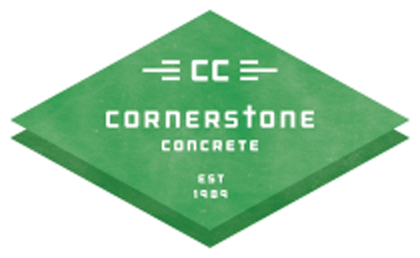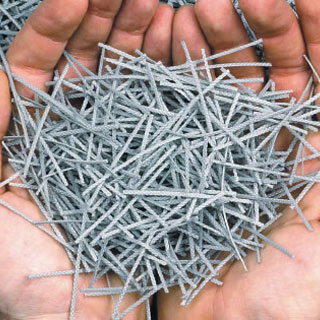- Macro synthetic fibers replace traditional steel rebar, providing better flexibility and crack resistance.
- These fibers offer non-corrosive and stain-resistant properties, reducing maintenance needs over time.
- The mixing of fibers directly into concrete simplifies the pouring process, eliminating the need for steel grids.
- Use synthetic fiber-reinforced concrete in various projects, including driveways, foundations, and roadways.
- Macro fibers’ flexibility accommodates Midwest temperature changes, making them ideal for Minnesota and Wisconsin driveways.
Traditional steel (rebar) has been used for decades as the primary reinforcement for concrete driveways and concrete projects in general. And for good reason; steel is one of, if not, the strongest alloy available to use. Engineers and scientists have been trying different material combinations to find stronger, more affordable, and less labor-intensive options. Alas, macro synthetic fiber reinforced concrete was born.
What are synthetic fibers for concrete?
Synthetic fibers are becoming the new favorable concrete industry material to beat. These synthetic fibers are made from synthesized polymers, coming from raw materials like petroleum-based chemicals. Synthetic fibers come out on top compared to natural fibers because they are more durable and can keep dye colors better. There are two different types of synthetic fibers: micro and macro fibers. Micro synthetic fibers are mainly used to reduce plastic shrinkage cracking. Micro synthetic fibers help mend this issue by holding some of that evaporated water in the concrete, so it does not get so dry and crack. On the other hand, macro synthetic fibers are larger fibers that can be used to replace reinforcing rebar and wire mesh to better control drying shrinkage cracking. Introduced in 2000 as an alternative to steel reinforcement, they are added directly to the concrete mix to provide more well-rounded reinforcement.
What advantages are there to macro synthetic fiber reinforced concrete?
Macro synthetic fiber reinforced concrete is used in several global applications to replace steel, and for good reasons. Some benefits of macro fiber concrete include:
- Stretchy – more flexible than rebar to account for long-term cracking, they can move more with the concrete during thermal changes
- Non-corrosive – no rust spots will appear at the surface
- Stain resistant – they are less sensitive to the elements than natural fibers and will not absorb stains as easily
- Reduction in shrinkage cracking – when a crack forms, there will be surrounding fibers available to bridge the crack; making more durable concrete and improving the longevity of your driveway
- Impact resistant – being mixed right into the concrete mix allows for stronger three dimensional reinforcement throughout the concrete driveway
- Easier pouring – instead of placing steel grids, the fibers are mixed right into the concrete, making the pouring process a bit simpler
These synthetic fibers are simply incredible. It’s no wonder why they have rapidly grown in popularity in the construction industry, being used in various projects, like:
- Concrete flooring
- Concrete foundations
- Walls and plastering
- Roads and pavements
- Parking lots
- Tunnels
This flexibility accommodates the consequences of temperature changes, particularly through harsh Midwest winters and humid summers. These fibers only further highlight the benefits of installing a concrete driveway.
Are they better than steel or rebar reinforced concrete?
In the eyes of Cornerstone Concrete, yes. We have completely switched from rebar or steel grid reinforced concrete to macro synthetic fiber reinforced concrete. Steel engineers may argue that steel reinforcement is still stronger, and they are correct. However:
- Steel is stronger than micro synthetic fibers only.
- Macro synthetic fibers technically have a lower tensile strength than steel, but there are more macro fibers throughout the concrete to increase the tensile strength overall.
- Steel is not flexible. If there is a shift in the ground the rebar is resistant, and will not flex with the change, causing more cracks.
As long as the fibers are added into the concrete mix properly, and the fibers can bond with the concrete properly, the tensile capacity will be maximized to produce a top-tier concrete driveway. When you think of concrete you think of strength, while that used to mean steel, it now means macro synthetic fibers. Trust our expertise to guide you to a better quality concrete driveway, particularly in Midwest climates.
Are you ready for your new concrete driveway? Contact us today for a Free Estimate and to see if we operate in Minnesota or Wisconsin near you.





